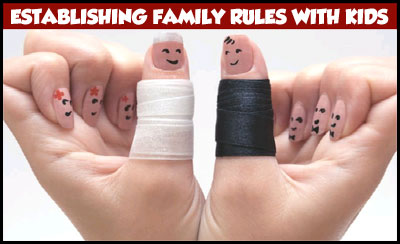
You must involve your kids while making family rules to reinforce good behaviour and inculcate good values and manners in them. Read on to find tips for establishing family rules with kids.Each family is different and unique in its own way, and must be having family rules. You need to establish family rules in order to help every family member know how to behave with each other, to help everyone achieve balance of their and other’s needs and learn the limits, to help your kids feel safe and secure, and to keep your family life peaceful and disciplined. If you want your kid to look up to you and grow following the values of your family, then you must establish the
family rules.
Who Shall Be Involved While Establishing Rules
It is very important to involve each and every member of the family while establishing family rules. Involving kids in rule-making helps them understand the rules and accept them. If your kid is very young, then you and your partner shall mutually set the rules. If your kid is above three, then you must sit with him or her and discuss out the rules and make him or her understand why the rules are needed to follow. When your kid grows up, he or she can contribute more in deciding the rules, making him or her be responsible for his or her own
behaviour. As you set the rules, you shall also frame the consequences for breaking them.
What to Consider While Establishing Rules
When formulating the family rules, you must take care of few points:
- Frame less and specific rules that are easy to understand and easy to remember.
- Try to support your kid’s growing independence while setting limits.
- Be prepared to negotiate few rules on not-so-important matters.
- Discuss with every family member if they have any objection for any rule.
- Make sure everyone understands the importance of every rule.
- Review the rules as your kid grows up and family’s situation changes.
- Make sure the rules shall be followed even when the elders are away from home.
What the Family Rules Shall Include
The most important basics of your family rules will be influenced by your
values, beliefs, circumstances, and every family member’s needs. Rules shall include the following:
- Safety
- Politeness
- Behaviour
- Manners
- Daily chores
- Non-violence
Different Kinds of Rules
Rules come in different shapes and sizes but have the common ground, specific, and easy to understand.
“Do” Rules: These rules help guide your kid’s behaviour in a positive way. For example:
- Be gentle with each other.
- Tell the truth.
- Be home by time.
- Knock on closed doors before you enter.
- Ask permission before you go anywhere.
- Put things back at their place after use.
- Turn off the electronics and electrics after use.
- Be thankful.
- Apologise for your mistakes.
- Respect each other’s space and property.
“Don’t” Rules :
Make sure there less “don’t” rules. Use them only when you cannot explain what to do otherwise. For example:
- Don’t spit.
- Don’t get in a car if the driver is drunk.
- Don’t drink alcohol.
- Don’t smoke.
- Don’t do anything illegal.
Ground Rules :
These apply everywhere with no change. For example:
- Speak politely.
- Do not hurt each other.
- Respect others.
Situation Rules :
There are rules for specific circumstances. For example:
- Wear seatbelt while travelling in a car.
- Be disciplined while visiting other’s house.
- Do not access illegal sites while using a computer.
Rules are effective only when they are followed. So if your child or anyone breaks the rule, you have to set the consequences also. You may warn them about the rules and give a second chance. Set
punishment if anyone breaks the rules again. Do not be very harsh that it damages the relationship, but make sure everyone understands and agrees to the consequences. As you establish family rules, you are ready to build a healthy relationship with your child and every other family member.
How to establish family rules? What are the benefits of involving kids while making family rules? How to make sure that family rules are followed by all the family members? Discuss here.




